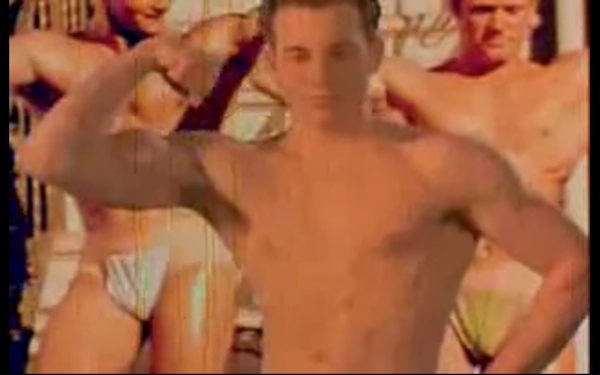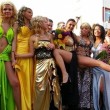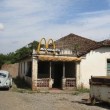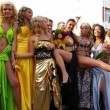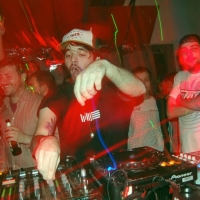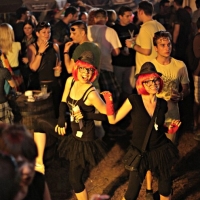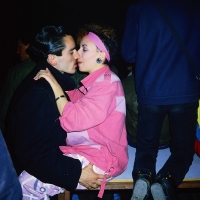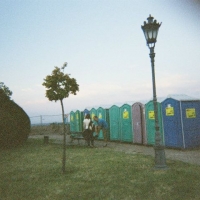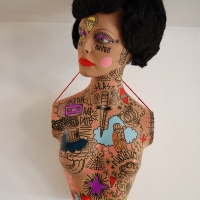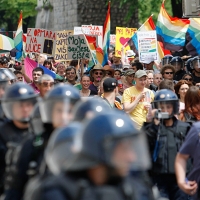Part two of some of the best Yugoslav pro-gay music videos and song lyrics from the 1970s onwards. Ranging from post-punk to electro-pop to traditional folk, many of these tracks were written by some of the coolest regional artists, back in the day when it wasn’t okay to be gay. Well, it still isn’t, at least in the Balkans. Read the Part one here
Hand in hand, chest to chest
In 1984 Ljubljana witnessed the Magnus festival titled ‘Homosexuality and Culture,’ featuring gay and lesbian films. While those film screenings are today considered the beginnings of the first continuous LGBT film festival in socialist Europe, Ljubljana’s gay scene (and Magnus festival at that) was far more diverse than merely film buffs outsmarting each other. One of the most agile and proactive of the scene’s representatives were the band Borghesia and FV video collective who produced some of the most fascinating music videos, videoart clips and documentary footage on gay lifestyles that can be found in the Balkans. To get a taste, here’s a short series of Borghesia’s mid-80s pro-gay videos, praised both for their visual merit and their darkly hedonistic electronic body music:
Borghesia – Noćne šetnje (Nightwalks, Ljubav je hladnija od smrti, 1985)
Nightwalks through the city parks/In the dead of the night/When everyone goes home/A roar from the dark is heard/Gravel creaks under one’s feet/The moon is full, there’s someone in the park/I just want you all to love me
Borghesia – On (Him, Ljubav je hladnija od smrti, 1985)
Him/He likes rough sex/Him/He likes these/Clean hands, high boots/Blood on the altar/Him/When he makes love/He seeks a blessing
Borghesia – Ogolelo mesto (Rugged City, Ogolelo mesto, 1988)
Hand in hand/chest to chest/Laying side by side/On the bed/Squeeze with me/Hug me tight/In sweat, in passion, in blood
Back to Croatia for another no-bollocks beauty. It’s the late 1980s in Pula and a band that would later become one the most influential punk rock bands in the region, KUD Idijoti, has just recorded one of their first 7″ singles entitled Hocemo cenzuru (We Want Censorship). A cherry on the top, this three-track recording of raw energy featured Preživjeti (To survive). It seems it was written as an homage to a friend of the band who died of AIDS but I could be wrong. Still, here’s the Yugo-gay punk anthem at its purest:
KUD Idijoti – Preživjeti (We remember Marjeto) (To Survive (We Remember Marjeto), Hocemo cenzuru, single, 1988)
Who’ll get the dick, who’ll get the balls/Who’ll get the stone/Who’ll get the bread/You’ll get the dick/I’ll get the balls/You’ll get the stone/I’ll get the bread/And then we’ll love each other/And you’ll be my friend/You’ll get the dick/I’ll get the balls/Well, take it, here you go/It’s not, not, not a problem/It’s important, it’s important that you’re my friend/You’ll get the dick/I’ll get the balls/You’re, you’re, you’re, you’re my best friend/But we have to figure out/Who’ll get the dick/Who’ll get the balls/Who’ll get the stone/Who’ll get the bread
Gay intimacy for the masses
There were at least two mind-blowingly popular bands from Sarajevo that released pro-gay songs in the later half of the 80s. The first one was a teenage-crowd pleaser, Plavi Orkestar. Teenagers themselves, they were probably the nearest Yugoslavia got to Beatlemania. They were young, androgynously ‘cute’ and adorned their cheesy pop in traditional folky outfit just enought to guarantee themselves a stadium-type fame for eternity. This live video for the slightly ambiguous Kad si sam, druže moj (When You’re Alone, My Mate) is a testament to Plavi Orkestar’s bombastic comeback in the 1990s.
Plavi Orkestar – Kad si sam druže moj (When You’re Alone, My Friend, Smrt fašizmu, 1986)
When you’re alone, my mate/Dial this number/Four, eight, two, two, three/And I’ll pick up/And I’ll pick up/Oh, when you give love/It’s not easy to realise/That you’re a nobody to someone/Who was everything to you/Who was everything to you/Hey, drinking or not, I’ll love you
Already selling out arenas for years, Sarajevo’s Zabranjeno Pušenje released a song with a pro-gay message in 1989. It’s been one of their biggest hits to this day. Due to a split in the band during the war in Bosnia and Herzegovina, with a singer and a guitarist, respectively, forming new bands under the same name, you can nowadays hear this song in a Zabranjeno Pušenje (Zagreb) or The No Smoking Orchestra (Belgrade) version. Here’s the latter’s live take on it from the 90s:
Zabranjeno pušenje – Javi mi (Male priče o velikoj ljubavi, 1989)
When left alone in the dark room with your memories/When wishing the morning would never come/You have to know that I still love you, you can always call me/Let me know, let me know, I’ll wait/… When your wife asks you: Well, seriously, what’s not to like?/Why don’t we ever do those things?/When she walks away to cry alone/When she slams the door/You have to know that I still love you, you can always call me/Let me know, let me know, I’ll wait/When becoming suspicious in the neighbourhood/For hanging out with kids all the time/When a local calls to you: You want a piece of ass, mate?/ You have to know that I still love you, you can always call me/Let me know, let me know, I’ll wait
Modesty Blase meets Mara
Then there was war in Bosnia and Croatia. It all became surreal like in a comic book. The socialist Yugoslavia eventually fell appart. New states had embraced capitalism full-handedly and, in addition to the TV diet of nationalism, homophobia persisted as well. And it still continues today.
In the international-sanctions-ridden Belgrade of the early 1990s, a brass-infused funk rock band made the local RHCP fans waiting for their favourite band’s gig in vein feel less saddened. They were called Deca Loših Muzičara or DLM. On their debut full-length they spat out this groove about a guy’s ex-girlfriend, Mara, who left him for another girl. He’s quite down but hey, there’s nothing wrong with that, says the guy, since no one can harm her. Check out the old-school, hard-to-come-by music video for the song:
Deca Loših Muzičara (DLM) – Mara (Dobar dan!, 1992)
Were we supposed to talk about love and hate?/Was I supposed to be a bit quicker?/A smile on my face but sadness in my heart/My dear Mara’s been kissed by another girl/She’s been kissing her everywhere/I’ve discovered a generator of burning problems/I’ve got a beautiful thing that she doesn’t/A smile on my face but teeth hidden/Now her beautiful thing’s been kissed by another girl/She’s been kissing her everywhere/A Friday is a day for a Wednesday/And that’s really alright/Outsiders and time-wasters can’t do anything to my Mara/They can’t do anything to my Mara
It was a long wait, but eventually a new pop song describing a passion between two women and sung by a female came about. This time it was by Bel Tempo, a jazzy pop duo made of siblings Suzana and Vlada Petričević. Here’s their lesbian-come-bisexual vision of Modesty Blaise:
Bel Tempo – Modesty Blase (Modesty, 1992)
You’re beautiful and attractive, exotic/Your lips, your breath and your moves excite/Your eyes, your laugh caresses my arms/I’m losing myself, I’ll kiss you/You’re my girlfriend/I love you/Your face is like the face of Modesty Blase/I like your dance /Dance with me only, slide down your body against mine/Dance with me only, let the boys wish/Dance with me only, slide down your body against mine/Dance with me only/leave the boys for me
Sisters and a fag
Odd as it may seem to some, the Eurovision song contest is a big deal in the Balkans. It sure was a big deal when the Slovenian qualifier in 2002 was a transvestite trio Sestre (Sisters). Their song Samo ljubezen (Only love) was written by Robert Pešut a.k.a. Magnifico and his wife Barbara. Magnifico is no stranger to the Slovenian gay community, particulary due to his 2000 hit Halo, gospodična (Hello, Miss), popularly referred to as ‘Magnifico je peder’ (Magnifico is a fag), after a chorus repeated in the song ad nauseam. While Magnifico-is-a-fag may have been an eye-opener to the general public, the lyrics were quite conventionally hetero, somewhere along the lines of recent Lollobrigida’s Moj dečko je gej (My boyfriend is gay). Sisters however, had their polished, formal-but-transy look work for them, even with rather conventional lyrics. As a result they became famous across the former Yugoslavia over night and although just a one-year wonder, they probably achieved more for the promotion of the ‘gay cause’ than most of the musicians from the region. Here’s Sisters’ or rather, Stewardesses’ live performance from the Eurovision in Tallinn, Estonia, covered by BBC’s Terry Wogan:
Sestre – Samo ljubezen (Only love, Souvenir, 2002)
I can give you only love/The one and only hope/Look into my Eyes/And don’t you worry/I know that you feel the same too/What you desire isn’t a sin/It’s love in the eyes/You know me more than you’re aware of/Although you’re closing your eyes/When you look at me you see what you are/You’ve been searching for a long time/For what you thought was right/But eventually you’ll choose a single thing
Back to the roots
Folk singers in Serbia haven’t been exactly famous for pro-gay themes in their lyrics, but there are a few noble exceptions.
Nedeljko Bajić Baja – Maska (Mask, Čežnja, strast i mržnja 1998)
I have nothing against your girlfriend/But she’s messing up my plans/Yes, I’m jealous, I see it flatters you/You either go with her or with me, I don’t want to be your mask/With her you visit midnight cafés/You’re not going for a drink with me but with her instead/She acts like she rules over you/This drives me mad and makes me uncomfortable
Seka Aleksić – Baš mi se sviđa tvoja devojka (I Really Fancy Your Girlfriend, Dođi i uzmi me, 2005)
You’ve been preying me for a long time/Looking at me all night long/Over her shoulder/When she caught you in the act/She smacked you/The kiddo isn’t naive/Although I’m on fire when you undress me with your eyes/And although that you’d give her up for me/And although I suspect I’m not normal because of it/I really fancy your girlfriend/She’s looking/I’m looking/You’re standing alone in wonderment/Insignificant at that moment/She’s on her way/I’m on my way/At an easy walking pace we’re leaving together
Finally, back to the roots, an homage to the one and only, Muharem:
U2 meets Muharem Serbezovski – Ramo, Ramo (mashup)
*The author is responsible for all the above (mostly literal) translations. Poor as they may be, you’re welcome to subject them to further improvements. Read the Part one here

